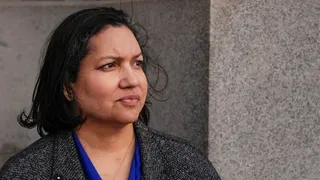June 4, 2010
Gay Massachusetts Bi-National Family Granted Yearlong Reprieve
Kilian Melloy READ TIME: 5 MIN.
An estimated 36,000 same-sex couples involve an American citizen and a person of a different nationality. Unlike heterosexual couples, bi-national same-sex families are not provided for under U.S. immigration law, meaning that they face long periods of separation.
Six states offer marriage equality for gay and lesbian families, but those state-level rights do not include the right to sponsor a same-sex spouse for permanent residency, a green card, or naturalization. Until and unless the federal government recognizes gay and lesbian families through marriage or its equivalent--or until a law specific to their needs is enacted, such as the proposed Uniting American Families Act--gay and lesbian bi-national couples have to work around those legal obstacles as best they can. But existing federal law doesn't make it easy; when it comes to families, the legal code is anti-gay in nature. The 1996 "Defense of Marriage" Act explicitly singles out gay and lesbian families for exclusion from legal recognition or protections on the federal level.
Though the odds are stacked against them, gay and lesbian bi-national couples continue to fight for their right to build a home and a life together. One happy couple that beat the odds lives in Massachusetts, the fist state to grant marriage equality six years ago. They are Tim Coco and Genesio Oliviera, reported the Boston Globe in a June 4 article.
The two married in 2005, but federal immigration rules meant they had to endure years of separation, with Oliviera in Brazil. On June 2, Oliviera was able to reunite with his American husband: the immigration service had given him permission to reside in the U.S. for a year, after Oliviera made a case that his life in Brazil subjected Oliviera to discriminatory treatment on the basis of his sexual orientation. Also, a doctor there had subjected Oliviera to sexual assault; his yearlong leave to reside in the U.S. was granted on under terms of a provision known as "humanitarian parole," the article said. Only a few hundred such paroles are granted every year.
It helped that the couple had advocates in high places, including Sen. John Kerry, Homeland Security Secretary Janet Napolitano, and the nation's Attorney General, Eric Holder.
"Here were two people who loved each other and were as committed to each other as you could ever imagine, and a quirk in the law was being allowed to keep them apart," stated Kerry. "I just wanted to do everything I could to reunite them."
"We're overjoyed. Words can't express it," Coco told the Globe, adding, "Every new moment now is a fresh new moment in our life."
"It seems like I never left," said Oliveira, going on to say that the enforced separation had "made Tim and I stronger than ever. Our commitment for each other, I always say to him, is unbreakable.''
Coco told the Globe that pursuing the case had cost about a quarter of a million dollars--so far. In order to secure permanent residency status, the couple will have to continue their efforts.
Still, the year they have gained is a significant triumph. But not everyone was congratulatory. "It's a side-door attempt at changing the Defense of Marriage Act," Center for Immigration Studies executive director Mark Krikorian told the Globe, going on to add, "That's the problem with our immigration laws; it's just this vast collection of exceptions for people who get the attention of a particular bureaucrat or judge or politician."
Brazil's immigration laws are fairer toward gay and lesbian families, but the social climate there is not necessarily welcoming toward GLBTs. U.S. government figures indicate that over one hundred GLBT people were murdered in Brazil in 2009.
Attempts at Reform
Last month, a trio of congressman spoke out about proposed immigration reform measures that would grant gay Americans the same right to sponsor a same-sex spouse that heterosexuals currently enjoy.
"Our legal immigration system is so dysfunctional and restrictive that we have created incentives for people to go around our system rather than going through it," said Rep. Luis Gutierrez, an Illinois Democrat, at a May 24 press conference. "Nowhere is this more true than for committed same-sex couples who have to make a painful choice between their family and the immigration laws of the U.S. that do not recognize these family units for the purposes of immigration." Added Gutierrez, "It seems to me that the cornerstone--the bedrock--of any comprehensive immigration reform is the unity of families."
"When I talk about an issue like this, I become the arch-conservative," said Rep. Mike Quigley, also a Democrat from Illinois. "Why? Because we're talking about family values."
Said the third congressman, openly gay Jared Polis, Democrat of Colorado, "Yes, we're talking about our LGBT families and our LGBT communities."
Gutierrez outlined reform in clear, concise language. "The goal must be to have an immigration system that keeps families together, enhances America's security, strengthens the economy and is true to the core values of this nation that guarantee freedom and protect the basic human and civil rights of every individual," he said.
But not if the U.S. Conference of Catholic Bishops has its way. The Bishops called for the provision that grants parity to same-sex couples to be stricken from plans in the Senate for an immigration reform bill, saying that it could endanger immigration reform for straights.
The Catholic Church is an ardent and relentless opponent to gay and lesbian family equality. The church holds that gays do not "choose" their sexual orientation, but insists that God calls non-heterosexuals to live in celibacy and forsake families of their own.
"While we support the general direction of the framework," a statement from the U.S. Conference of Catholic Bishops said, "we strongly oppose extending marriage-like immigration benefits to same-sex relationships." Added the statement, "This proposal threatens to undermine the opportunity to bring together the Congress and the American people around a common solution to the important challenge of immigration reform."
For GLBT equality advocates, however, the provision was a sign of hope that couples forced to live apart because one of them is a citizen of another country might find some relief. "Today's inclusive framework is an historic step forward for lesbian, gay, bisexual and transgender binational families," stated Immigration Equality's Rachel B. Tiven.
Added Tiven, who serves as the group's executive director, "The LGBT community is committed to comprehensive immigration reform that includes everyone. Our community understands, all too well, the pain of being punished and singled out for who we are. Our solidarity with the larger immigrant community is deep, and our resolve to fix our broken immigration system is real."
Tiven continued, "We will work for a bill that provides a path to citizenship for the undocumented, including those who are LGBT. Time is of the essence for those facing separation or deportation, and Congress must act, urgently, to pass humane, comprehensive reform."
The framework was created by Sens. Harry Reid, of Nevada; Chuck Schumer, of New York; and Robert Menendez, of New Jersey, an April 29 press release from Immigration Equality said. "The principles, which are meant to guide Congressional crafting of immigration reform legislation, specifically call for key provisions of the Uniting American Families Act (UAFA) to be part of a future reform bill," the release noted.
"Immigration Equality hailed the inclusion of the language, which would allow LGBT citizens and legal permanent residents to sponsor their foreign national partners for residency in the United States. Under current law, no such sponsorship is available," the release continued. "An estimated 36,000 face imminent separation or exile because of discriminatory immigration policies."
Kilian Melloy serves as EDGE Media Network's Associate Arts Editor and Staff Contributor. His professional memberships include the National Lesbian & Gay Journalists Association, the Boston Online Film Critics Association, The Gay and Lesbian Entertainment Critics Association, and the Boston Theater Critics Association's Elliot Norton Awards Committee.




